What is the Float Conference?
The 2015 Float Conference took place last weekend in Portland Oregon. This event is a conference where people interested in float tanks go including: researchers, float tank manufactures, salt companies, float center employees/owners, float enthusiasts, NSF employees, health department regulators, and more. The conference is a place for everyone in the industry to get together and to have meaningful discussions about the direction we want the floating industry to move. Also the conference has been a place for researchers to discuss their past research on the benefits of floating and Justin Feinstein and his team from LIBR (Loretta Institute for Brain Research) have recently started sharing their findings of their new research. We are in exciting times for the float industry as more and more tank manufactures pop up, new float centers open every year, and more people know about floating than ever before.
Important talks at the conference:
It’s difficult to pick out certain talks that will be mentioned here because every talk at the conference was really phenomenal and informative. Ashkahn from Float On really has done a great job getting these speakers together and lined up. The amount of hours put into this conference was tremendous and Ashkahn showed that himself alone spent over 1,000 hours working on the conference and in total it was closer to 2,000 for everyone involved. I cannot say thank you enough to the team at Float On for organizaing this conference because without them it would not have been possible.
LIBR research
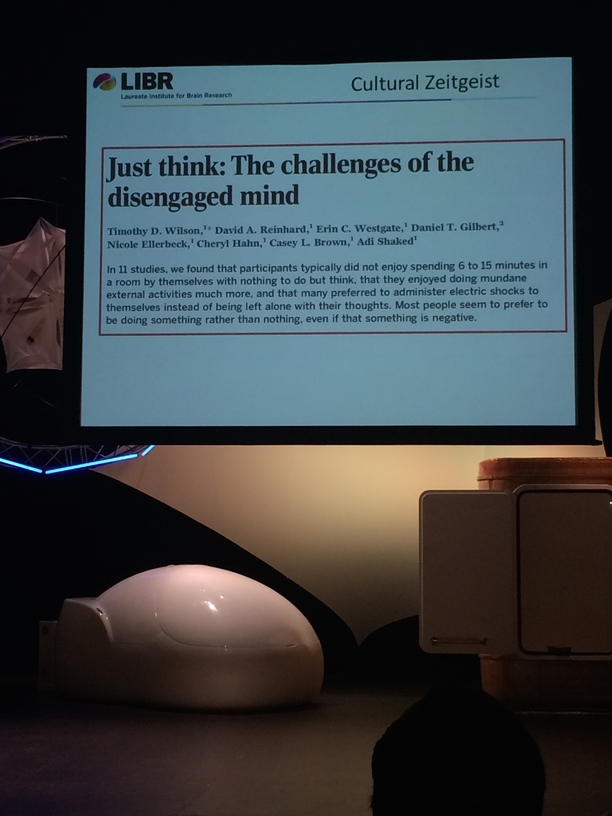
(This study was referenced in a talk by Justin Feinstein. Those who have floated clearly know this is not the case in the tank)
One speaker that really stood out was the neuropsychologist Justin Feinstein. The work he and his team are doing at LIBR is truly amazing, they are taking fMRI images of the brain before and after 3 floats to see how it changes with these floats. They are doing RCTs (randomized controlled studies) in order to validate that their findings are scientifically accurate. Currently the research is preliminary but we will soon have research that has solid conclusions on how floating can change the brain. He and his team want to study the effects of floating on PTSD, addictions, anxiety, and eating disorders such as anorexia. I won’t go over specifically what the results were from the fMRI scans but his team is very fascinated in interoception (being aware of your physical sensations such as heart beat or breath) and it seems like the float tank can enhance this, based on my own experience. This is interesting because in Vipassana meditation there is a heavy emphasis on focusing on physical sensations such as feeling hot, cold, tingling, numbness, etc.
Emily Noren
Another great talk was by Emily Noren, a young woman that had anorexia, who discovered floating about a year ago in search to help with this disease. Emily got on the stage, with such an open heart, started talking about her battle with anorexia from a young teenager until an adult. She had a great analogy about how this voice in her head she called “Ed” would aggravate her eating disorder and make her think about counting calories, weight, body image etc. She started using the tank because a friend of hers, Sandra Calm, was a co-owner of the Float Shoppe and suggested she give floating a shot. She started floating and it wasn’t easy at first but she made an effort to keep coming back and with time this voice “Ed” started fading away. A new voice took place of “Ed” which stopped caring about the calories and what she ate. After floating for about a year she has seen a noticeable diminish in the eating disorder. Her speech was so touching it brought me to tears and her talk was met by a standing ovation at the end. She has written a book called Unsinkable about it which she has posted on her website (for free) at emilykatenoren.com and can also be purchased on Amazon.
Entreprenuer talk
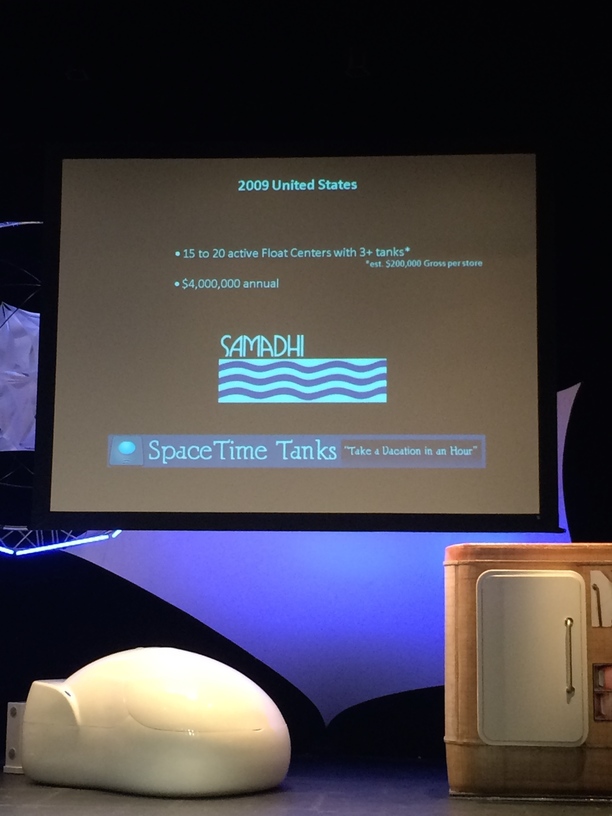
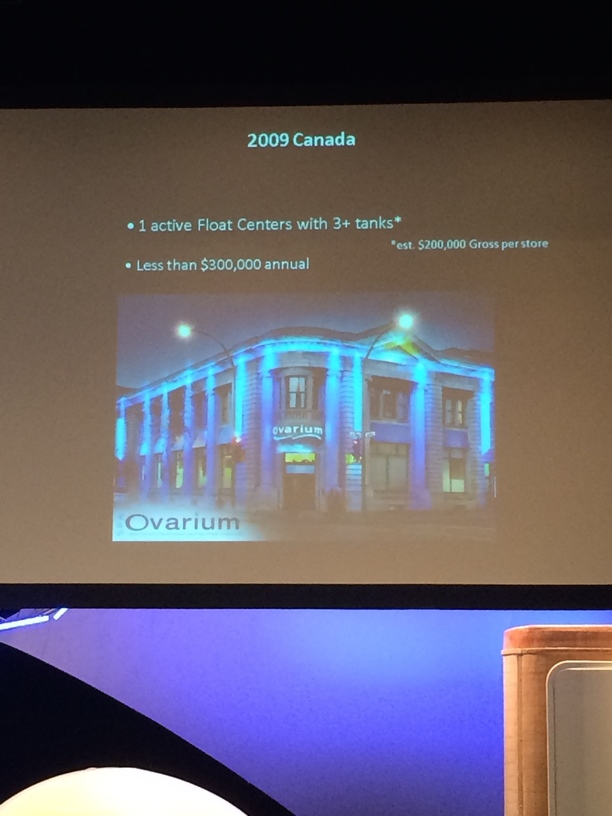
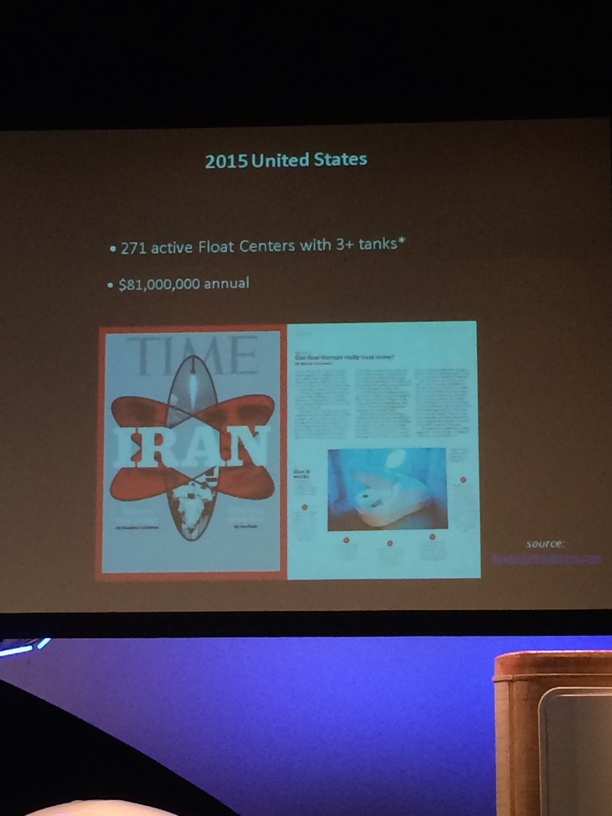
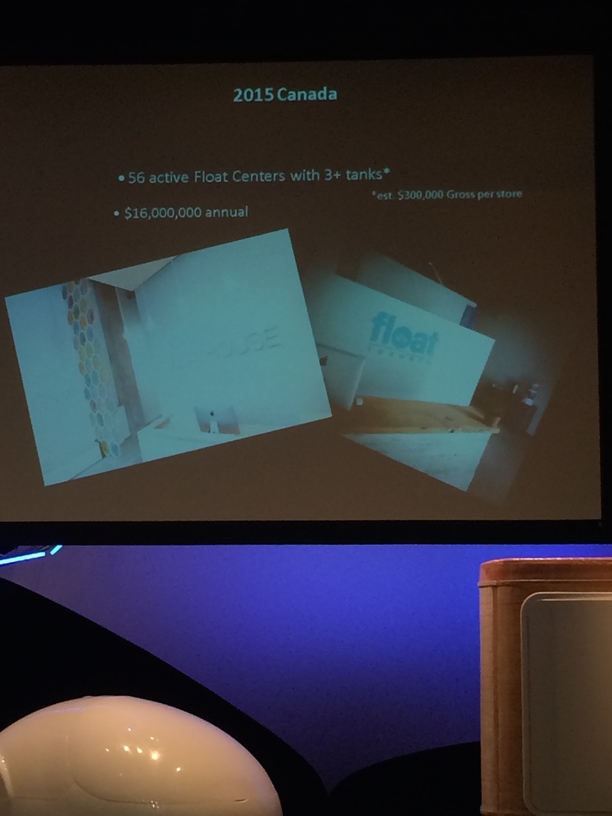
There was a great talk by Nick from True REST and Andy from Float House which are two large franchises the former started in Arizona and the latter Canada. They were explaining how float centers shouldn’t devalue the floats by continuously offering discounts like Groupon, Social Shopper, and Living Social. They were explaining how the industry is taking off and float centers are popping up rapidly. For example in 2009 in the USA there were around 15-20 float centers with 3+ tanks and in Canada there was just 1 center. In 2015 there are now 271 active float centers in the USA and in Canada there are 56 active float centers. Floating seems to be spreading faster than ever and I don’t see it slowing down anytime soon. Especially based on the fact that there were about 500 people at the conference this year.
Glenn and Lee Perry
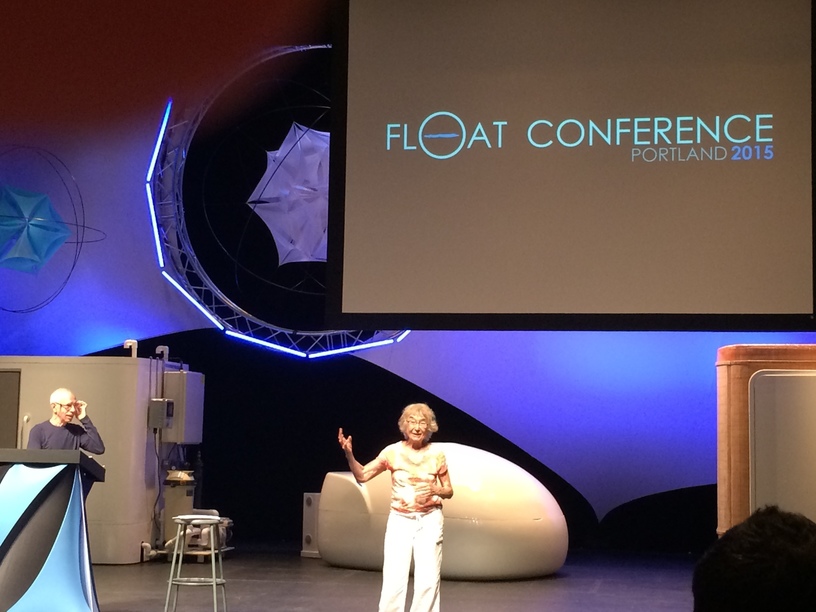
Glenn and Lee Perry were at this years conference again. Glenn and Lee were two of the first residential float tank manufactures back in the 1970s with John Lilly creating the first tank outside of the research labs. They have a company called Samadhi Tank Co where they sell durable float tanks some of which have lasted over 25 years. Their talk was mostly focused on why float centers should start selling float tanks. The reason behind this is that not everyone who wants to float will want to do it in a public place. As always the Perry’s talk was very inspirational and you can really see how much passion they have to keep this industry moving forward.
Float On
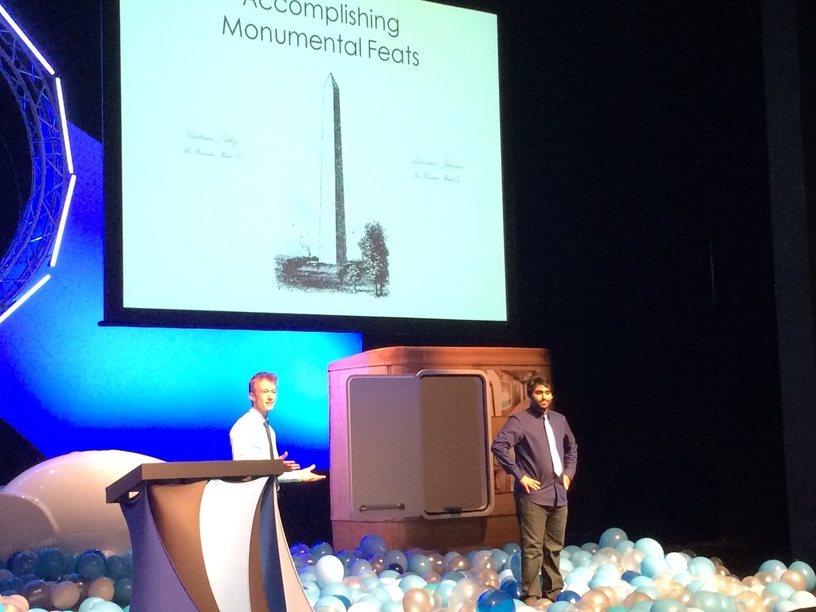
Graham and Ashkahn from Float On always seem to have an incredibly energetic talk that seems to keep everyone engaged. This year they talked about how the Washington monument took over 100 years to be built and how there was a lot of planning involved instead of work actually being done. I think the purpose of this talk was to really inspire future float tank manufactures and center founders to stop worrying and planning and start doing. Kind of like the saying goes “one in the hand two in the bush”. You can always correct mistakes later on and it is impossible to predict everything that will go wrong, especially with a float center.
Kevin Johnson from Zero Gravity Institue
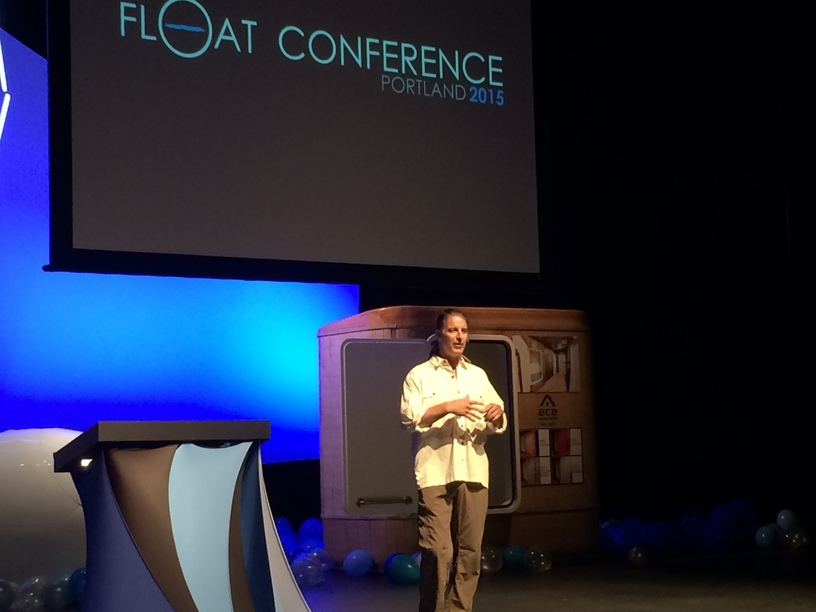
Kevin Johnson had an amazing talk last year about how to market your float business to early adopters. This year’s talk by him also was outstanding. He first explained how Zero Gravity Institute is going to partner up with Onnit to create even better float rooms. He then talked about how as an industry we need to band together and cooperate with one another. This was really refreshing as the industry is getting larger we are starting to see more people getting into the industry for various motivations. Kevin also explained how he would be happy to help any float tank center who is planning on opening for free. This is really great to hear especially because he is setting an example for other float centers to help one another out.
Crash from Float Labs
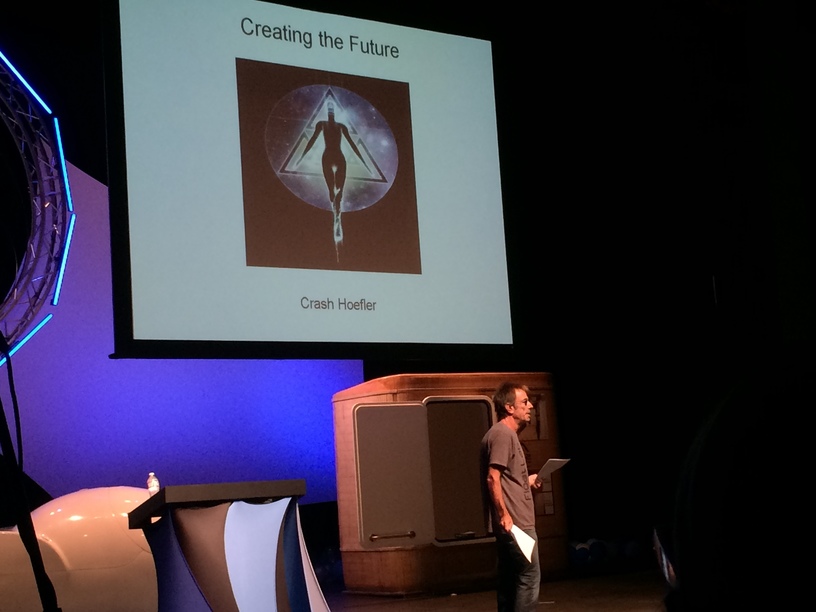
Last but not least Crash from Float Labs spoke this year about why we need to protect our industry with getting our float tanks NSF certified. Last year was a bit controversial because some people misunderstood and thought that because he initiated the NSF standard for float tanks that he was trying to flush out competition by getting expensive tests done. I’ve come to think this is not the case but instead he just wants this industry to be safe and to not have to worry about health departments shutting down float tank centers from the lack of NSF certifications. Crash really seems to care about this industry and doesn’t care what other people think of him especially if he is doing what he thinks is best.
Summary
Both years I’ve been the float conference have been amazing experiences. I would recommend this conference for anyone who likes floating or the float culture. I plan on going back next year August 20th-21st 2016 and would love to see more people out there (leave a comment below if you are going to attend)! Every year it seems like more and more people attend and it’s really great to see the same people each year. There is really something special about this industry that revolves around a sense of community and good will for others. More info can be found on the float conference’s website here.

